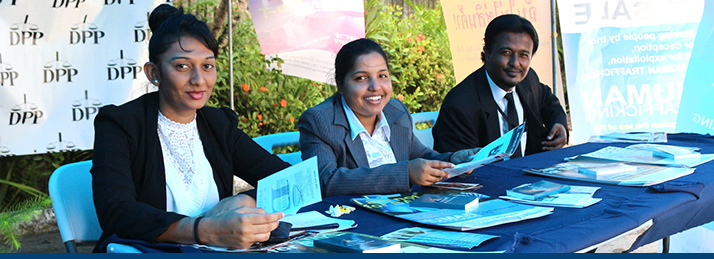
State Counsel, Ms Mehzabeen Khan, Ms Jayneeta Prasad and Mr Rajneel Kumar at a public display forum

State Counsel, Ms Mehzabeen Khan, Ms Jayneeta Prasad and Mr Rajneel Kumar at a public display forum
The Office of the Director of Public Prosecutions (ODPP) is an independent office by virtue of section 117 of the 2013 Constitution. The ODPP is motivated by the principle that it is in the interests of justice that the guilty be brought to justice and the innocent are not wrongly convicted.
The ODPP was first established under the Fiji Independence Act 1970. The Constitution stipulates the continued existence of the ODPP as per section 117.
Mandate
The mandate of the ODPP is set out in section 117 of the Constitution. Section 117(8) empowers the Director of Public Prosecutions (DPP) to:
(a) institute and conduct criminal proceedings;
(b) take over criminal proceedings that have been instituted by another person or authority (except proceedings instituted by the Fiji Independent Commission Against Corruption);
(c) discontinue, at any stage before judgment is delivered, criminal proceedings instituted or conducted by the Director of Public Prosecutions or another person or authority (except proceedings instituted or conducted by the Fiji Independent Commission Against Corruption); and
(d) intervene in proceedings that raise a question of public interest that may affect the conduct of criminal proceedings or criminal investigations.
The powers of the DPP may be exercised by the Director (DPP) personally, or through other persons acting on the Director’s instructions.
117.—(1) the office of the Director of Public Prosecutions established under the
State Services Decree 2009 continues in existence.
-Chapter 5- Judiciary Part B- Independent Judicial and Legal Institutions, Constitution
of the Republic of Fiji
Independence of the ODPP
The Constitution in section 117 (10) states: In the exercise of the powers conferred under this section of the Constitution, the Director of Public Prosecutions (DPP) shall not be subject to the direction or control of any other person or authority, except by a court of law or as otherwise prescribed by this Constitution or a written law.
Furthermore, the Constitution requires Parliament to ensure that adequate funding and resources are made available to the ODPP, to enable it to independently and effectively exercise its powers and perform its functions and duties.
The Constitution also empowers the DPP to appoint any legal practitioner whether from Fiji or from another country to be a public prosecutor for the purposes of any criminal proceeding.
Section 51(2) of the Criminal Procedure Act, 2009, also empowers the DPP to appoint police officers to be police prosecutors for the purpose of conducting prosecutions in the Magistrates’ Courts of Fiji.
The DPP also has the authority to appoint, remove and institute disciplinary action against all staff (including administrative staff) of the ODPP.
In summary, the Constitution authorizes the DPP to independently govern all matters concerning public prosecutions and ensures its independence not only for prosecution matters but also authorizes the Director, alone, to determine all matters pertaining to the employment of all staff and administrative matters concerning the ODPP.
Our Mission and Values
The ODPP is proudly committed to upholding the values, policies, rights and freedoms set out in the Constitution.
Additionally, our Mission and Value statements articulate the essential principles that guide the conduct of the ODPP and our Code of Conduct binds all staff to act with honesty, and integrity, and to uphold the ODPP’s values and key objectives at all times.
Our MISSION: To deliver a fair and independent prosecution service, committed to the rule of law.
Our VISION: To deliver a modern and professional prosecution service that supports national goals and aspirations of peace and good governance.
Our CORE VALUES: In carrying out its mandate, the ODPP is guided by three key values: Independence; Fairness; and Courage.